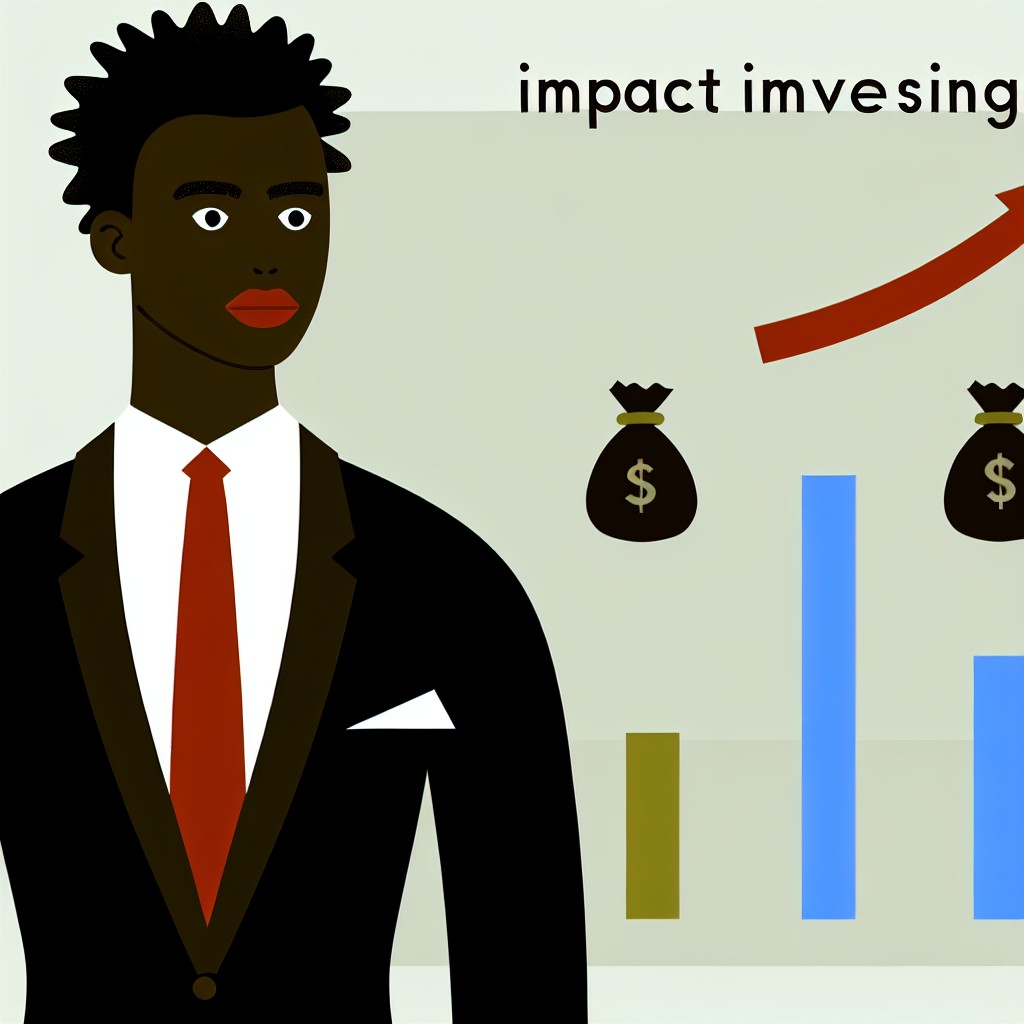Introduction to Impact Investing and Its Relevance to Nigerian Businesses
What Impact Investing Means
Impact investing combines financial returns with positive social and environmental outcomes.
Investors actively seek ventures that create meaningful community impacts.
Unlike traditional investing, it measures success beyond profits alone.
Consequently, it aligns capital with sustainable development goals.
This approach attracts businesses committed to responsible growth.
Importance of Impact Investing in Nigeria
Nigeria faces pressing challenges in education, healthcare, and the environment.
Impact investing offers solutions by funding innovative local projects.
Moreover, it supports businesses that enhance livelihoods and boost resilience.
It also encourages transparency and accountability in corporate practices.
Therefore, impact investing fuels economic growth while addressing societal needs.
How Nigerian Businesses Benefit from Impact Investing
Businesses gain access to a growing pool of mission-driven investors.
This funding helps expand operations and improve product quality.
Additionally, impact investing enhances corporate reputation and stakeholder trust.
It opens opportunities for partnerships with global development organizations.
Ultimately, it drives innovation that meets local community demands effectively.
Examples of Impact Investing Success in Nigeria
GreenLeaf Agro Ventures secured investments to promote sustainable farming.
HealthReach Clinics improved rural healthcare access through impact funding.
SunBright Energy expanded clean energy solutions using impact capital.
These companies demonstrate how impact investing supports scalable solutions.
They inspire other Nigerian businesses to embrace impact-driven growth.
Overview of the Current Impact Investing Landscape in Nigeria
Emergence of Impact Investing in Nigeria
Impact investing in Nigeria has gained significant momentum over the past decade.
Investors now prioritize social and environmental returns alongside financial profits.
Consequently, this trend aligns with Nigeria’s growing focus on sustainable development goals.
Leading firms like TerraGreen Capital and Eko Sustainable Ventures actively drive this market.
Moreover, international partnerships have increased support for local impact projects.
Key Sectors Attracting Impact Investments
The renewable energy sector attracts considerable interest from impact investors.
Companies such as SolarHub Nigeria provide affordable solar solutions to underserved communities.
In addition, agriculture receives funding for sustainable farming and supply chain improvements.
For example, AgroLife Innovations supports smallholder farmers through technology and training.
Healthcare also experiences growth with investments focusing on affordable and accessible care.
Companies like HealthBridge Nigeria improve rural healthcare infrastructure effectively.
Challenges Facing Impact Investing in Nigeria
Despite progress, the market faces challenges including regulatory uncertainties.
Many investors express concern over inconsistent policies affecting project sustainability.
Furthermore, limited data availability hinders accurate impact measurement.
This gap makes it difficult for businesses to demonstrate value to impact investors.
Additionally, liquidity constraints restrict the ability of some enterprises to scale quickly.
Nonetheless, ongoing dialogue between regulators and investors aims to resolve these issues.
Opportunities for Nigerian Businesses
There is a growing pool of domestic and international capital dedicated to impact investing.
Innovative companies like Lumina Water Solutions successfully attract such investments.
Furthermore, impact investing enables businesses to enhance community engagement and brand value.
Also, these investments often bring technical expertise and access to networks.
Therefore, Nigerian businesses positioned to address social or environmental challenges stand to benefit greatly.
Identifying Sectors in Nigeria That Can Benefit Most from Impact Investing
Agriculture and Agribusiness
Agriculture remains a cornerstone of Nigeria’s economy and livelihood.
Many smallholder farmers lack access to capital and modern technology.
Impact investing can provide funds for sustainable farming techniques.
Consequently, it can increase food security and reduce poverty.
Companies like Verdant Fields and AgroCapital Partners already pioneer impact-driven agriculture.
Moreover, agribusinesses benefit from improved supply chains and market access.
Renewable Energy and Clean Technology
Nigeria faces significant energy shortages affecting millions of people.
Renewable energy projects offer scalable solutions to this challenge.
Impact investors can fuel innovations in solar, wind, and biomass energy.
For example, SolTech Innovations expands solar home systems in rural areas.
Additionally, clean technology helps reduce environmental pollution nationwide.
Therefore, impact investing supports Nigeria’s transition to a green economy.
Healthcare and Social Services
Nigerian healthcare infrastructure often struggles with underfunding and access.
Impact investing can improve medical services, especially in underserved communities.
Companies such as CarePoint Clinics enhance affordable healthcare delivery.
Similarly, investments can expand health insurance and telemedicine services.
Thus, social impact capital drives healthier and more resilient populations.
Education and Skill Development
Education quality and access remain critical challenges across Nigeria.
Impact investors can support innovative schools and vocational training centers.
Organizations like BrightPath Academy empower youth with practical skills.
Furthermore, technology-enabled learning platforms can reach remote learners.
Consequently, investment in education boosts employability and economic growth.
Financial Inclusion and Microfinance
Many Nigerians lack access to formal banking and credit facilities.
Microfinance institutions and fintech startups provide vital financial services.
Impact capital helps scale affordable loans and savings products.
For instance, MobiFinance offers mobile-based loans to small entrepreneurs.
Moreover, financial inclusion promotes entrepreneurship and reduces inequality.
Therefore, this sector presents high potential for impact-driven growth.
You Might Also Like: Investment Strategies for Diversifying Nigerian Business Assets
Strategies for Nigerian Businesses to Attract Impact Investment Capital
Building a Strong Social and Environmental Impact Case
Nigerian businesses must clearly define their social and environmental goals.
This clarity helps investors understand the positive change the business drives.
Startups like GreenTech Farms showcase how they reduce carbon footprints while improving livelihoods.
Furthermore, articulate measurable impact metrics to demonstrate progress transparently.
Consequently, impact investors gain confidence in the business’s commitment.
Developing a Robust Financial Model
Investors seek businesses with sustainable revenue models alongside impact goals.
Therefore, create detailed financial projections to showcase profitability potential.
Livestream Nigeria leveraged this approach by combining social media outreach and monetization strategies.
Moreover, highlight cost efficiencies and scalable operations to emphasize growth.
This effort reassures impact investors about their capital’s security and return possibilities.
Engaging with Local and International Impact Networks
Networking plays a vital role in accessing impact investment opportunities.
Join forums such as Lagos Impact Investing Forum to connect with like-minded stakeholders.
Additionally, participate in global platforms like the African Development Impact Network.
These connections introduce access to funding, mentorship, and partnerships.
Consequently, businesses increase visibility and credibility among potential investors.
Demonstrating Transparent Governance and Accountability
Impact investors prioritize transparency and governance standards.
Implement clear reporting systems to track social, environmental, and financial outcomes.
For example, SunLight Energy Nigeria uses quarterly reports to keep investors informed.
Strong governance builds trust and strengthens investor-business relationships.
Thus, maintain adherence to regulatory frameworks and ethical business practices.
Adopting Innovative Business Models
Innovative solutions often attract impact investors focused on transformative change.
For instance, OkoroTech developed a pay-per-use solar product addressing energy access.
Highlight unique features that differentiate the business from competitors.
Furthermore, emphasize how innovation directly benefits underserved communities.
This approach tends to capture investor interest and drive funding commitments.
Leveraging Government and NGO Partnerships
Collaborations with governments and NGOs can enhance credibility and impact potential.
Azikiwe Agriculture partners with regional ministries to supply affordable fertilizers.
These alliances often come with co-funding or technical support opportunities.
They also help validate business models through pilot projects and scaling efforts.
Hence, seek and nurture such partnerships early in the business development phase.
Communicating a Compelling Impact Story
Telling a persuasive story helps capture investor attention and emotional engagement.
Highlight real beneficiary testimonials and community transformations.
Envision Renewables shares stories of farmers doubling yields through solar irrigation.
Use multimedia presentations to demonstrate tangible social benefits vividly.
Ultimately, effective storytelling differentiates businesses in a crowded investment landscape.
Find Out More: The Role of Private Equity in Boosting Nigerian Corporate Finance
Measuring and Reporting Social and Environmental Impact Effectively
Setting Clear Impact Metrics
Businesses should define clear social and environmental goals from the outset.
These goals provide a foundation for measuring progress accurately.
For example, Olumide Ajayi of GreenMinds Nigeria emphasizes measurable targets.
Clear metrics ensure stakeholders understand the business’s impact ambitions.
Moreover, concrete goals facilitate better data collection and analysis.
Utilizing Reliable Data Collection Methods
Companies must use reliable tools to gather accurate social and environmental data.
Digital platforms like ImpactTrack and EcoMetrics help streamline this process.
Grace Olatunji from NextGen Ventures leverages technology for consistent reporting.
Consistent data collection improves credibility with investors and communities.
Additionally, integrating qualitative feedback captures broader impact stories.
Engaging Stakeholders in the Reporting Process
Engagement with beneficiaries and local communities enriches impact reporting.
It creates transparency and strengthens trust with partners and investors.
For instance, Endeavor Impact Consultancy involves all stakeholders actively.
This approach also highlights unintended consequences and areas for improvement.
Consequently, reports become more comprehensive and actionable.
Adopting Recognized Standards and Frameworks
Applying global standards like IRIS+ or the Global Reporting Initiative enhances legitimacy.
These frameworks provide standardized indicators and reporting guidelines.
Chukwuma Nwosu of Urbane Impact Advisors recommends such practices.
Standardization simplifies comparisons with other impact investments.
As a result, it attracts interest from international investors seeking transparency.
Communicating Impact Results Effectively
Clear and engaging communication is essential for conveying impact results.
Visual tools like infographics and dashboards make data more accessible.
Sarah Eke of ImpactReach advises tailoring reports for different audiences.
Regular updates maintain ongoing stakeholder engagement and support.
Thus, effective communication maximizes the impact narrative’s reach and influence.
Explore Further: Sustainable Investment Strategies for Nigerian Businesses
Challenges Nigerian Businesses Face in Adopting Impact Investing and How to Overcome Them
Limited Awareness and Understanding
Many Nigerian businesses lack sufficient knowledge about impact investing.
This gap hinders their ability to identify its benefits and opportunities.
Furthermore, impact investing concepts often seem complex and unfamiliar.
To overcome this, companies should invest in educational programs and workshops.
For example, Onyeka Industries partnered with GreenFuture Capital for targeted training sessions.
This collaboration improved their team’s understanding and readiness for impact investments.
Access to Adequate Funding
Nigerian businesses frequently struggle to secure funds for impact-driven projects.
Traditional financing models may not prioritize social or environmental goals.
Moreover, lenders often view impact investments as high risk.
Consequently, firms must diversify their funding sources strategically.
They can explore partnerships with impact-focused venture capitalists or development finance institutions.
For instance, Lumina Agro secured capital through a joint venture with ImpactWave Partners.
This approach provided both funding and strategic guidance for sustainable growth.
Regulatory and Policy Challenges
The regulatory environment in Nigeria can complicate impact investing efforts.
Frequent policy changes create uncertainty for business planning.
Also, inadequate incentives limit investor motivation to support impact projects.
Businesses should actively engage with policymakers to advocate for clearer regulations.
They must participate in industry associations to influence policy reforms positively.
Sunrise Textiles successfully lobbied for tax breaks that encouraged green investments.
Measuring and Reporting Impact
Many companies find it difficult to quantify their social and environmental impact.
Inconsistent metrics reduce credibility with investors and stakeholders.
Additionally, data collection can be resource-intensive and technical.
Businesses should adopt established frameworks like the Global Impact Investing Network’s standards.
Hiring specialized consultants helps to design effective measurement tools.
For example, Zenova Energy implemented robust tracking systems with help from EcoMetrics Advisors.
This transparency attracted new impact investors aligned with their values.
Cultural and Mindset Shifts
Traditional business mindsets focus primarily on financial returns.
Such views can limit openness to impact-focused strategies.
Moreover, skepticism about measuring social value persists in many sectors.
Leadership must champion impact investing’s importance throughout the organization.
Regular internal communication fosters a culture that embraces social responsibility.
For instance, Adebola Foods’ CEO, Kemi Adebayo, regularly highlights impact goals in company meetings.
This practice motivates employees to support and innovate sustainable initiatives.
Explore Further: Strategic Asset Allocation for Nigerian Corporate Finance

The Role of Government Policies and Incentives in Promoting Impact Investing
Creating a Supportive Regulatory Environment
The Nigerian government actively designs policies to encourage sustainable investment.
Clear regulatory frameworks reduce risks for impact investors.
These policies create confidence among businesses and investors alike.
For instance, the Securities and Exchange Commission of Nigeria has enhanced guidelines for impact fund registration.
Consequently, this attracts more institutional investors seeking social and financial returns.
Tax Incentives and Financial Benefits
The government offers tax breaks to businesses participating in impact investing.
Specifically, companies investing in social enterprises can receive tax deductions.
Additionally, exemptions on capital gains tax encourage longer-term investments.
These incentives make impact investing more financially attractive to Nigerian firms.
For example, Evergreen Farms received a tax holiday after adopting sustainable farming practices.
Grant Programs and Funding Support
Government agencies provide grants to startups addressing social challenges.
Such grants reduce initial capital barriers for innovative businesses.
Moreover, collaborative funds involving government and private sector amplify impact investing.
These programs also offer technical assistance to improve business models.
Recently, Lagos State launched a fund supporting renewable energy projects led by local entrepreneurs.
Public-Private Partnerships Encouraging Impact
The government partners with private organizations to drive impact investing initiatives.
These collaborations leverage resources and expertise from both sectors.
Public-private partnerships foster infrastructure development and inclusive growth.
They also facilitate knowledge exchange between policymakers and investors.
For instance, the partnership between SolarTech Nigeria and Kaduna State helped expand solar access in rural areas.
Raising Awareness and Capacity Building
Government offices organize workshops to educate businesses on impact investing benefits.
Furthermore, they promote success stories to inspire more participants.
Capacity-building programs help entrepreneurs align business goals with social impact metrics.
This approach strengthens the ecosystem and attracts impact-focused capital.
The Nigerian Investment Promotion Commission regularly hosts seminars featuring experts like Emeka Obi, promoting sustainable finance.
Case Studies of Nigerian Companies Successfully Leveraging Impact Investing
EcoProtec Nigeria: Advancing Environmental Sustainability
EcoProtec Nigeria secured impact investment to expand its eco-friendly packaging solutions.
The funding enabled the company to increase production while reducing plastic waste.
Moreover, EcoProtec partnered with local farmers to source biodegradable materials sustainably.
Consequently, the company improved community livelihoods through fair-trade partnerships.
As a result, EcoProtec attracted additional investors focused on environmental and social returns.
HealthReach Clinics: Expanding Affordable Healthcare Access
HealthReach Clinics leveraged impact capital to open clinics in underserved rural areas.
The investment helped build medical infrastructure and train healthcare workers.
It also funded mobile health units that reached remote communities efficiently.
Thus, HealthReach increased access to quality healthcare for low-income populations.
In turn, their success demonstrated the scalability of health impact investing in Nigeria.
AgroWave Ventures: Supporting Smallholder Farmers with Technology
AgroWave Ventures received impact funds to develop digital platforms for farmers.
The platform provides real-time weather updates and market pricing information.
This innovation helped farmers optimize crop production and maximize profits.
Additionally, the company offered affordable loans facilitated by impact investors.
Therefore, AgroWave improved food security and stimulated rural economic growth.
GreenLight Energy: Driving Renewable Energy Access
GreenLight Energy attracted impact investors to scale solar mini-grid projects.
The company installed solar systems in off-grid communities across northern Nigeria.
Impact capital enabled lower upfront costs, making clean energy affordable.
Communities gained access to reliable electricity, improving education and business activities.
Furthermore, GreenLight Energy created job opportunities in installation and maintenance.
EduForward Initiative: Enhancing Educational Outcomes Through Investment
EduForward secured impact investment to develop technology-driven learning centers.
The centers target underserved youth in urban and rural Nigerian areas.
Investment funds upgraded facilities and provided teacher training programs.
As a result, students’ literacy and digital skills improved significantly.
EduForward’s model influenced further impact investing in education across Nigeria.
Critical Factors Driving Success in Impact Investing
- Clear social or environmental mission aligned with business goals.
- Strong leadership focused on measurable impact and financial sustainability.
- Collaboration with local communities and stakeholders for inclusive growth.
- Transparency and consistent reporting to attract and retain investors.
- Innovation in products and services that address pressing Nigerian challenges.
These companies demonstrate how Nigerian businesses can harness impact investing.
Consequently, they create positive change while achieving financial success.
Integrating Impact Investing into Corporate Social Responsibility and Sustainability Plans
Aligning Business Goals with Social Impact
Companies like Verdant Harvest Limited enhance their CSR by embracing impact investments.
This strategy ensures that social goals match core business objectives.
By doing so, firms promote sustainable growth along with community development.
Moreover, this alignment increases trust among stakeholders and investors.
Embedding Impact Investing in Sustainability Frameworks
Leading Nigerian companies such as TerraNova Energy integrate impact investing into their sustainability frameworks.
They identify key environmental and social targets to guide investment choices.
Consequently, their projects address critical issues like clean energy and education.
These initiatives demonstrate a commitment beyond compliance to create shared value.
Evaluating and Measuring Impact
Impact investing requires rigorous evaluation methods to measure performance.
Firms like Omolu Microfinance use metrics to track social and financial returns.
Regular assessments help fine-tune CSR activities for better outcomes.
Hence, transparent reporting strengthens accountability and supports continuous improvement.
Collaborating with Impact Investors and Stakeholders
Businesses in Lagos partner with impact funds such as Lagos Sustainable Ventures.
These collaborations provide capital and expertise to scale sustainable projects.
Inclusive engagement with community leaders ensures relevant and effective solutions.
Moreover, multi-stakeholder alliances foster innovation and broaden impact reach.
Incorporating Impact Investing in Corporate Culture
Fostering an organizational culture that values impact investing is crucial for long-term success.
Training programs empower employees to understand and support sustainability goals.
Additionally, companies like Nuru Health promote internal initiatives aligned with impact objectives.
Such cultural integration drives commitment and enhances overall corporate responsibility.
Future Trends and Opportunities for Nigerian Businesses in Impact Investing
Growing Interest from Local and International Investors
Investor interest in Nigeria’s impact investing space is rapidly increasing.
Global funds, such as Evergreen Capital Partners, are actively exploring Nigerian enterprises.
Moreover, Nigerian investors like Amina Okafor are driving domestic impact investments.
This growth creates new capital access opportunities for purpose-driven businesses.
Consequently, enterprises focusing on sustainable development gain competitive advantages.
Technological Innovations Driving Impact
Emerging technologies enable Nigerian businesses to scale social and environmental solutions.
Startups like Solaria Energy harness solar technology to improve rural electrification.
Additionally, mobile platforms enhance financial inclusion and healthcare delivery.
Businesses can leverage these tools to attract impact investments more effectively.
Therefore, embracing innovation will remain critical in future investment trends.
Government Policies Encouraging Impact Investments
The Nigerian government increasingly supports sustainable and socially responsible investments.
Recent policies promote renewable energy and agriculture sectors as investment priorities.
For example, the National Economic Recovery Plan includes incentives for green businesses.
Such policies enhance investor confidence and stimulate market growth.
Hence, firms aligned with government priorities benefit from easier capital mobilization.
Expanding Sectors Offering Impact Opportunities
The healthcare sector presents growing demand for affordable quality services.
Companies like HealLink Clinics attract capital by improving healthcare access nationwide.
Similarly, agritech firms are innovating to boost food security and sustainable farming.
Financial inclusion startups targeting underserved populations also offer strong opportunities.
These sectors align closely with key social challenges and investor interests.
Collaborative Models Amplifying Impact
Partnerships between local businesses and international investors enhance impact outcomes.
For instance, the Lagos Impact Network connects SMEs with global impact funds.
Collaborative approaches help share risks and combine expertise across stakeholders.
This synergy leads to scalable solutions and improved investment returns.
Thus, businesses should proactively seek strategic alliances to attract impact capital.
Building Robust Impact Measurement Frameworks
Accurate measurement of social and environmental outcomes increases investor trust.
Companies like GreenBridge Analytics support Nigerian firms in impact reporting.
Adopting clear metrics facilitates transparency and continuous performance improvement.
Consequently, strong impact assessments differentiate businesses in competitive markets.
Therefore, investing in measurement capacities will be vital going forward.
Additional Resources
Our KPMG specialists across Africa know the power of ESG to …




